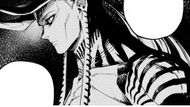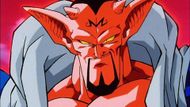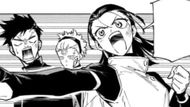Jujutsu Kaisen Modulo is a small follow-up of Gege Akutami, and it quickly changes the landscape of the franchise: the manga begins decades after the first series and adds an alien element that alters the dynamics. Jujutsu Kaisen Modulo dates its action to about 68 years after the defeat of Sukuna and introduces the Simurians at once, an alien race that has come in search of contact with jujutsu society. This premise recontextualizes the previous supernatural threads as belonging to a much larger world.
Dragon Ball has unmistakable echoes in the manner Jujutsu Kaisen Modulo presents its new villainous entity, but these echoes are mostly of a textual nature (names and structural similarities) and commentary-based, rather than a direct writerly confession. The first books of Jujutsu Kaisen Modulo describe a Simurian ruler whose name transliterates to the name Dabura, justifiably popular in Dragon Ball Z, and the alien comparison of power has been explicitly stated in mainstream media.

The new installment, Jujutsu Kaisen Modulo, by Gege Akutami, reveals the existence of the Simurians and a Simurian King who is reportedly on equal footing with Sukuna with regard to sheer threat. The shift in scope was immediately flagged by journalists and critics: outlets recapped the opening of Modulo as an alien invasion that results in an antagonist of Sukuna rank and a diplomatic plot that gave paranormal authority to Japan. Such facts are laid down in chapter summaries and critical write-ups.
Analysts and readers soon narrowed on name-related and narrative echoes in Dragon Ball. The most tangible parallel is the appearance of a Simurian ruler sporting a name that fans read and spread as Dabura: in the books of Dragon Ball, Dabura is the Demon King character that plays an antagonistic, kingly role. The name of the Simurian leader has been publicized in fan threads and discussion boards and cross-linked with the Dragon Ball character; mainstream media coverage has captured the same. The Dragon Ball connection is a defensible observation, as far as the textual evidence is concerned.

Once those basics are in, it should be noted that one should distinguish between fact validation and pattern-matching. Jujutsu Kaisen Modulo has not (as of yet) a direct author statement that states that he was inspired by Dragon Ball to create this character. We have instead:
(1) an evident name overlap that fans and journalists have raised concerns over;
(2) a genre precedent - several long-running shonen have, in part, retold the alien invasion story much later in their history (a pattern that commentators invoke when comparing Modulo to earlier series); and
(3) commentary by critics that the extraterrestrial arrival of Modulo is narratively akin to earlier series.
The three mentioned points render the Dragon Ball inspiration hypothesis tenable and well-established within the fandom and the press, but not as an authorial assertion.
Jujutsu Kaisen Modulo — what the chapters actually show and how that lines up with Dragon Ball
Chapters of Jujutsu Kaisen Modulo published thus far describe diplomatic relations between humans and the Simurians, the Simurian mothership hovering over Nevada, and the messenger of the Simurians meeting the officials of Japanese jujutsu face-to-face. The Simurian leader is also portrayed as a force of the first-order change: critics refer to the ruler as Sukuna-level, and popular sources discuss the leader as the new peak threat of the franchise. The structural element being criticized as equivalent to Dragon Ball is the development of an alien monarch with power so great. An element of the narrative where late reveals would transform eldritch or demonic antagonists into part of the broader alien culture.

In comparison, the story of Dragon Ball used alien revelation (e.g., the demon-king status of Piccolo being re-implemented in DBZ as being an alien race) as a means to add scale and add galactic stakes. Jujutsu Kaisen Modulo reflects that method: a world formerly grounded on earth is stretched to a planetary-scale confrontation, based on a curse. Its naming echo (Dabura) is similar to an intertextual nod - and reviewers and readers have acted as though it was - but it is analytical evidence, not an official credit.
Overall, it is evident that Jujutsu Kaisen Modulo contains definite, attributable similarities to Dragon Ball in the naming, breadth, and structural storytelling decisions. The name of the Simurian ruler and the choice to unveil an alien civilization are by far the most tangible connections. Both the name and the scale of the threat have been covered in reputable outlets in the first chapters of the novel. All these facts contribute to a Dragon Ball influence, a responsible deduction, which is quite common among critics and readers, but not a direct confession on the part of Gege Akutami. To date, Jujutsu Kaisen Modulo is itself an expansion of the JJK mythos: relying on a well-worn shonen formula (where aliens grow stronger and stronger, and royal villains threaten the protagonists), it builds its own logic and inner interests.
